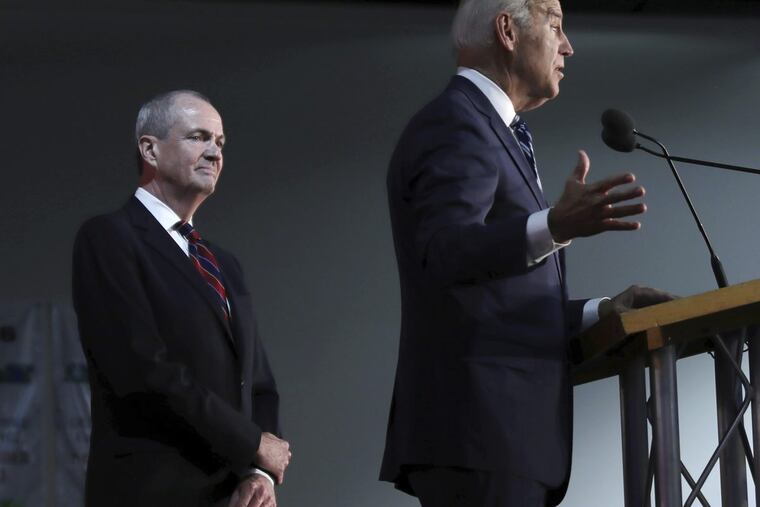N.J. governor's race: Murphy, ex-Goldman exec, says he'll limit spending if he wins Dem primary
Phil Murphy, the multi-millionaire former Wall Street executive, will agree to limit his spending in accordance with the state's public financing program should he win next week's Democratic gubernatorial primary, his campaign said Wednesday.

Phil Murphy, the multimillionaire former Wall Street executive, will agree to limit his campaign spending in accordance with the state's public financing program should he win next week's Democratic gubernatorial primary, his campaign said Wednesday.
Murphy, the front-runner for his party's nomination, has lent his campaign $16.3 million of his own money and spent $20.1 million overall in the primary, according to campaign-finance records made public Wednesday.
After shunning his rivals' calls to limit his spending in the primary, Murphy surprised New Jersey political observers by agreeing to spend no more than $13.8 million in the general election campaign.
"I think that it's in some ways a prudent decision, because it removes the stigma of so much money influencing the election — at least the general election, which will be an advantage for Murphy," said Brigid Harrison, a professor of political science and law at Montclair State University.
"I also think that it is a bit of a leap of faith, because once he signs on to this, who knows what's to come, and he's constrained in his actions and, more important, in his expenditures," she said.
Murphy spent two decades at the Wall Street investment firm Goldman Sachs and served as President Barack Obama's ambassador to Germany from 2009 to 2013.
The most money ever spent on a New Jersey gubernatorial campaign is $53 million, adjusting for inflation, by former Goldman CEO Jon S. Corzine in 2005. Corzine, a Democrat, won that year but lost reelection in 2009 to Gov. Christie.
Murphy's Democratic opponents said his announcement was disingenuous.
Jim Johnson, a former U.S. Treasury undersecretary who is also seeking the Democratic nomination, described the move as a "politically motivated flip-flop" that wouldn't "fool New Jersey voters."
Murphy has "brazenly tried to buy this election," Johnson said in a statement, and is "trying to fool voters into thinking he cares about money in politics."
Also running in the Democratic primary are Assemblyman John S. Wisniewski and State Sen. Raymond J. Lesniak. Murphy has spent five times as much as the rest of the Democratic field combined. He leads the candidates with the support of 34 percent of primary voters, according to a May 25 Stockton University poll.
"Ex-Goldman Sachs banker Phil Murphy's campaign has shown a stunningly poor ability to manage money in this campaign," said Wisniewski's campaign manager, Kevin Keefe. "If he can't handle the rigors of the election, then how can he handle the state budget?"
A spokesman for the leading Republican contender, Lt. Gov. Kim Guadagno, said, "After Murphy spent $20 million of his Goldman Sachs fortune to buy off the Democratic Party, the county chairs and political insiders, we welcome the news that Murphy has decided to accept the lieutenant governor's challenge and put away his checkbook."
Guadagno has spent $2 million. Her top challenger for the GOP nomination is Assemblyman Jack Ciattarelli.
Murphy's decision was first reported Wednesday by the Bergen Record. His campaign confirmed the news but declined to explain the decision.
Under the state's public-financing program, candidates who raise and commit to spending a minimum of $430,000 qualify for $2 in public funds for every dollar they raise from private donors.
They cannot spend more than $25,000 of their own money.
Had Murphy agreed to participate in the public-financing program in the primary, his spending would have been capped at $6.4 million — about a third of what he has actually spent.